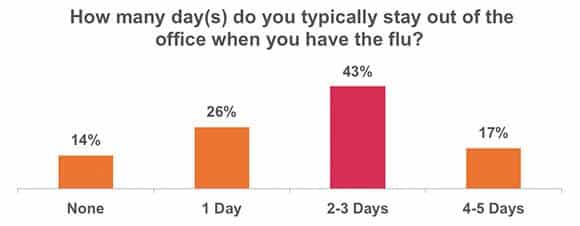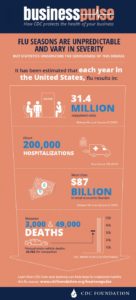It’s that time of year again — we’re at the start of the annual epidemic of seasonal influenza, which (in North America) peaks between now and April. As a business owner or office manager, you may well know the tremendous disruption that influenza, commonly known as the flu, can cause when it spreads from one employee to the next across your organization. According to a recent review of the scientific literature, each individual who comes down with the flu can miss anywhere from a day and a half to nearly six days of work.

Another way to look at it: flu and related influenza-like-illness (ILI) cause 45% of lost workdays among older employees. For a smaller business, losing that much time to key employees being down with the flu could be economically damaging.
But it can be worse – because influenza can be deadly too.
While we haven’t seen a severe pandemic of influenza since the World War I era — which killed millions of people around the world — the flu continues to claim its toll of victims year after year, particularly among those over age 65. The CDC estimates that over a period of three decades (1976 – 2007), flu-related deaths in the US ranged from 3,000 to 49,000 people each of those years.
 Flu Economic Costs Add Up: Estimates as High as $87.1 Billion Each Year
Flu Economic Costs Add Up: Estimates as High as $87.1 Billion Each Year
At the macroeconomic level, there is quite an economic cost to each year’s seasonal flu epidemic. According to another study is published in the scientific journal Vaccine, flu cases resulted in 3.1 million hospitalized days and 3.4 million outpatient visits, with a medical bill that averaged $10.4 billion annually. The projected lost income due to illness (or worse, loss of life) came to $16.3 billion annually. Adding up these two figures gives us an estimate of the total cost of flu each year: $87.1 billion, according to this study.
Flu Shot Frequently Asked Questions
1. Why Should Someone Get Flu Shot?
If you get a flu shot at the beginning of flu season, you’re statistically much less likely to get influenza this year. For example, last flu season the CDC (Centers for Disease Control) found that children who were immunized with the flu shot were 60% less likely to end up at the doctor’s office with a case of the flu. Also, if you do happen to contract the flu despite getting a flu shot, your symptoms will be much milder and shorter if you’ve had the flu shot.
There’s another important reason to get the flu shot: you’re not only protecting yourself, but you’re also helping protect those around you. If enough people in a given community or workplace are vaccinated, a concept that virologists call Herd Immunity can kick in. Establishing herd immunity means that there’s much less likelihood of the virus spreading through the group; this can also help protect infants under six months of age, or those rare individuals who cannot get the flu shot from contracting the flu.
2. Are Flu Shots Safe?
The CDC reports that hundreds of millions of people over the last 50 years have been safely vaccinated with the flu shot, making it one of the safest medical products available. Even if you experience mild side effects, they will be much less severe than contracting influenza itself.
3. Should Kids and Pregnant Women Get a Flu Shot?
Since 2010, the CDC has recommended that everyone who is six months or older get a flu shot. This includes pregnant women and people with chronic health conditions, such as HIV.
(There are rare exceptions to this guidance, see item 4 below.)
By taking a universal flu vaccination approach, the CDC believes we can expand protection against the flu to more people and help protect those who are at high risk of serious complications from influenza.
Note: While nearly everyone should get a flu shot, the actual vaccine formulations may vary, depending on your age. For example, the formula for seniors older than 64 is different from the one given to younger adults or the one designed for children.
4. Who Should Avoid Getting a Flu Shot?
There are just a few cases where a flu shot is not recommended or should only be taken under care of a medical provider; these include:
- Infants younger than six months old cannot receive the flu shot.
- Individuals who feel unwell or are currently ill with a cold or flu should talk to their doctor before having a flu shot.
- Individuals who have ever had Guillain-Barré Syndrome, an autoimmune disease associated with rapid-onset muscle weakness.
- Individuals with severe, life-threatening allergies to ingredients in the vaccine, which might include allergies to gelatin, antibiotics or eggs, should speak with their doctor before getting a flu shot.
For example, persons with a history of severe allergic reaction to eggs (e.g. something more severe than hives) should either avoid the vaccination or have it done in a medical setting under the supervision of a healthcare provider who could manage any potential severe allergic reactions.
5. Is It OK to Get a Flu Shot Every Year?
As long as you fit within the guidelines noted above in sections 3 and 4 above, it’s not only recommended to get a flu shot every year, doing so can help enhance your immunity against different flu strains in the future.
There is evidence from some clinical trials that flu shots can provide protection against similar flu viruses for an additional 6 to 8 months beyond the current flu season. For certain virus strains, this extended protection might last up to three additional years.
So getting a flu shot every year can help you fend off the flu in the future seasons as well.
6. Is It OK for Someone to Have a Flu Shot for the First Time in His or Her Life?
As long as you fit within the guidelines for getting a flu shot (see sections 3 and 4 above), then having your first flu shot will help you build up immunity to this season’s influenza virus.
7. Does the Flu Shot Provide 100% Protection against from getting sick?
The answer is no; the flu shot cannot guarantee 100% protection against getting the flu. However, statistically speaking, you are much less likely to come down with the flu after having the flu shot. If you do ultimately contract the flu (despite having had the flu shot), the CDC believes that your symptoms will likely be milder and the duration of your illness will be shorter if you have had the flu shot this season.
8. What is the Right Time to Have Flu Shot? What If I Don’t Feel Well Right Now?
The best time to have the flu shot is in October at the beginning of the flu season. However, if you don’t feel well, review our guidelines in sections 3 and 4 above and talk to your doctor about your symptoms for having a flu shot.
If you have children, it’s especially important to get them vaccinated early, as the CDC and the American Academy of Pediatrics (AAP) may recommend a series of two shots for maximum protection for your child, which will take time.
How to Set Up a Flu Shot Event at Your Office

As we mentioned at the beginning of this article, if you are a business owner or office manager, then you need to take proactive steps now to help prevent flu epidemics at your workplace.
Fortunately, the CDC has rated a very simple kit for employers who want to create their own flu shot event.
You can download the kit directly from the CDC website.
It even includes links to materials you can use to promote your flu vaccination event, including ready-made files for printing posters, sending emails and posting on social media.
The next step is to get a healthcare provider on site to administer flu shots for your employees.
Here is a suggestion: you might want to take a moment to speak with your healthcare insurance provider to learn about the different options they have for providing wellness benefits to employees, such as flu shots. Be sure to get a clear understanding of how these costs could be reimbursed if that is part of your coverage of agreement.
For example, the healthcare insurance company may have a preferred provider that they would like you to work through; on the other hand, they may prefer that you conduct a flu shot event in your office in partnership with a third-party entity, such as a pharmacy.
That’s exactly what we did here at Formaspace. We partnered with a local Walgreens pharmacy, which sent out staff to our factory headquarters here in Austin to administer flu shots for our employees.
Hosting a flu shot event at Formaspace was simple and fun to organize, and it’s good to know that it will help protect our employees, their families and their community from outbreaks of flu.

Are you planning to encourage your employees to get flu shots this season?
Let us know, and be sure to tell us about other ways you’ve been working to improve employee health at the workplace.










